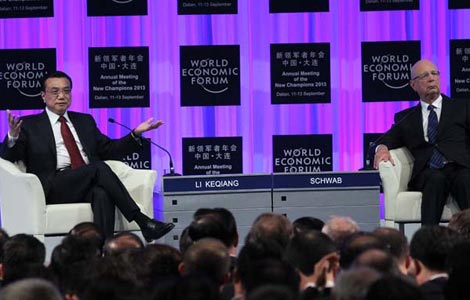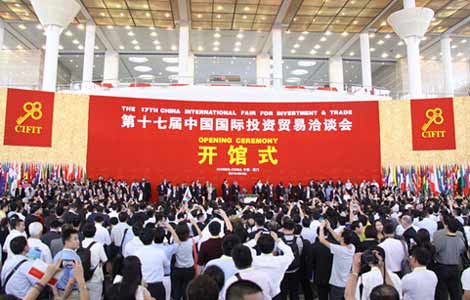Can China withstand global funds shifts?
Updated: 2013-09-12 13:49
(Xinhua)
|
||||||||
NEW YORK - Due to the anticipated US exit from its quantitative easing (QE) program, some emerging markets have been hardest hit and suffered damaging capital outflows.
Though faced with challenges against the backdrop of increasing external risks and accelerating opening-up, China's economy, in the opinion of global observers, is competent to make it through the hard times as China enjoys a balanced economy both internally and externally, an adequate foreign reserve and a more comfortable policy space.
QE effects on global economy
As a major central bank in the world, the US Federal Reserve (Fed) has a powerful influence on the world economy.
The 2008 US financial crisis triggered global economic turbulences that have lasted for five years. And the quantitative easing (QE) program, especially three rounds of QE policy, has made liquidity flooded around the world.
Under the anticipated exit of QE following continuous US economic recovery, emerging economies will inevitably suffer negative effects.
Statistics show the asset price of some emerging economies, including stock, bond and currency, has declined dramatically as investors are pulling massive funds out of emerging markets every week.
The Brazilian real, Indian rupee and South African rand have hit the lowest point in recent years, which has brought considerable risks for economic stability.
Taking India as an example, the rupee currency exchange rate against the US dollar has devaluated by nearly 20 percent, ranking the worst among major currencies globally, and its economy became worrying.
Though the Indian government has implemented corresponding policies, such as import restrictions, liquidity tightening and easing in succession, the efforts have been futile. Investors are loosing patience and confidence in emerging markets.
Inborne problems exposed
Market turbulence was a reflection of external risks, but inborne problems were also exposed.
Analysts believe that investors will withdraw part of their capital from the emerging markets amid the expected decrease in liquidity, but the high-level domestic and foreign deficits plus intensive dependence on exporting raw materials will have a much bigger impact on these economies.
Li Xiaoxi, a stock manager of Principal Global Investors, LLC, told Xinhua that when the United States ushered in QE policies, the developed countries were struggling with the financial crisis.
At present, data show that the US economic recovery is stabilized, so the Federal Reserve started to quit the easing and resort to contingency, which means the returns of investment in the United States will go up, attracting the capital to phase out from the emerging markets to the US market, Li explained.
But the root cause of the money withdrawal is the fact that some emerging markets bear the burden of high foreign red ink while domestic financial situation is also in quagmire.
Zhou Anjun, a researcher with BNY Mellon, believes that investors seek high returns. It is understandable that they will leave those countries that have a big hole of deficits and insufficient foreign reserves and favorable policies.
Li said some emerging countries rely heavily on exporting their reserve of raw materials. Their income drops as global demand slips and the price of raw materials slides accordingly.
Moreover, the central banks of some countries were doing badly in coping with the bulk of capital flow, which deteriorated the situation.
Can China be an exception?
Compared with the currency depreciation and stumbling stock markets in other emerging powers, China's yuan remained stable, so was the Chinese stock market.
Some observers contributed this to China's balanced trade and fiscal policy, sustained economic growth and strong capacity to accommodate the global spill-over.
Reports said the two pools -- a $3 trillion foreign reserve and a 20-percent RRR (reserve requirement ratio) -- that China's central bank stressed have played a big role in stabilizing national liquidity when the dollar rises and international investments flee.
Zhou said investors consider low-quality economies more fragile to outside risks, but in comparison, China's current account is balanced and its national finance runs better.
The latest statistics also eased the worries of some investors about China's economic slowdown.
In July, the pace of China's import and export growth both turned positive. The index of national industrial enterprises with sizable scale has speeded up.
In August, China Manufacturing Purchasing Managers' Index released by HSBC and the national statistics bureau was better than expected.
At present, inflation has been kept at a low level in China, and so was its dependence on hot money.
Experts suggest China continue to push ahead with its economic restructuring and expanding domestic consumption, hence making itself less susceptible to external influence.

 Premier stresses transformation of the economy
Premier stresses transformation of the economy
 Soyuz capsule returns from space station
Soyuz capsule returns from space station
 China's Christian churches reduce leaders' age ceiling
China's Christian churches reduce leaders' age ceiling
 Student's rare blood bonds Kazakhstan and China
Student's rare blood bonds Kazakhstan and China
 Apple's low-end phone price disappointing
Apple's low-end phone price disappointing
 US marks 9/11 anniversary
US marks 9/11 anniversary
 German Bach elected as IOC president
German Bach elected as IOC president
 Implant surgery for boy's eyes a success
Implant surgery for boy's eyes a success
Most Viewed
Editor's Picks

|

|

|

|

|

|
Today's Top News
China Daily Asia Weekly wins media award
Report questions US firms pursuing cloud computing in China
Reducing poverty gains momentum in Asia
China turns to US sorghum for animal feed
China's global firms face 'trust gap'
Li stresses transformation of economy
US delivers weapons to Syrian rebels
FM dismisses Philippine accusations
US Weekly

|

|






